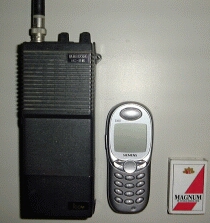
A radiotelephone (or radiophone) is a communications system for transmission of speech over radio. Radiotelephone systems are not necessarily interconnected with the public "land line" telephone network. "Radiotelephony" means transmission of sound (audio) by radio, in contrast to radiotelegraphy (transmission of telegraph signals) or video transmission. Where a two-way radio system is arranged for speaking and listening at a mobile station, and where it can be interconnected to the public switched telephone system, the system can provide mobile telephone service.
The word phone has a long precedent beginning with early US wireless voice systems. The term means voice as opposed to telegraph or Morse code. This would include systems fitting into the category of two-way radio or one-way voice broadcasts such as coastal maritime weather. The term is still popular in the amateur radio community and in US Federal Communications Commission regulations.
A standard landline telephone allows both users to talk and listen simultaneously; effectively there are two open channels between the two end-to-end users of the system. In a radiotelephone system, this form of working, known as full-duplex, require a radio system to simultaneously transmit and receive on two separate channels, which both wastes bandwidth and presents some technical challenges. It is, however, the most comfortable method of voice communication for users, and it is currently used in cell phones and was used in the former IMTS.